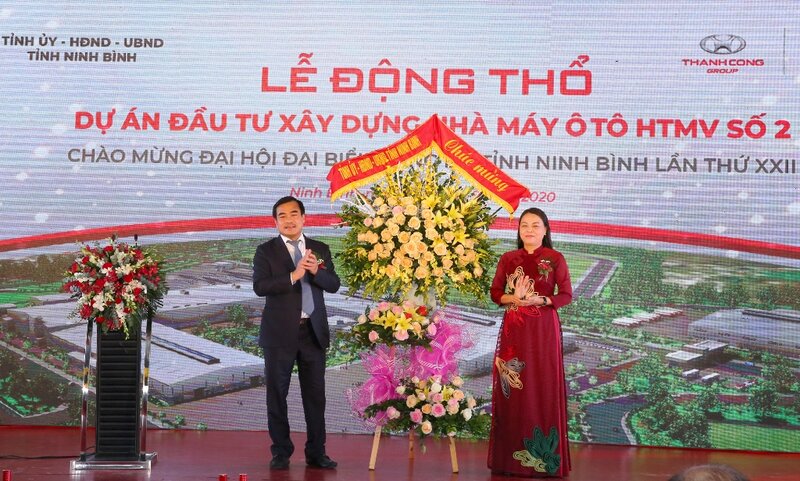Hyundai starts building US$138-million automobile plant in Vietnam
The plant, considered one of the most important projects of Hyundai, is invested with an estimated VND3.2 trillion (US$137.44 million) and able to produce 100,000 vehicles per year.
TC Motor, a joint venture of Vietnam’s Thanh Cong Group and South Korea’s Hyundai Motor, on September 20 held the ground breaking ceremony for the construction of automobile plant Hyundai Thanh Cong No.2 at Gian Khau industrial park in northern Ninh Binh province.
| Overview of the groundbreaking ceremony. |
The plant, considered one of the most important projects of South Korea conglomerate Hyundai, would cover an area of 50 hectares in the industrial park. It has an estimated investment capital of VND3.2 trillion (US$137.44 million) and production capacity of 100,000 vehicles per year.
Divided into two construction phases, the first phase of the project is set to be completed in June 2022 and the second in June 2025.
Once the plant is completed, Hyundai would have two manufacturing facilities in Vietnam with a combined production capacity of 170,000 units per year.
Hyundai’s latest project is in line with the development strategy of Vietnam’s automobile industry that aims to foster a strong and developed automotive sector and contribute to economic development.
In the first eight months of 22, Truong Hai Auto Corporation (Thaco) led the market in the with 49,940 units sold, down 16% year-on-year, followed by TC Motor with 40,987 and Toyota with 34,743.
Automobile is considered a key industry in Vietnam, accounting for approximately 3% of national GDP. Over the past recent years, the country’s automotive market has been growing at an average rate of 20 – 30% annually.
However, this industry was severely impacted by the Covid-19 pandemic, with a decline of 15% in sales volume this year compared to its prevision earlier this year, according to Viet Dragon Securities Company forecast.
The government has been adopting a number of supporting policies to boost sales of made-in Vietnam cars in the remaining months of the year, including the decision to slash the registration fee for domestically-produced cars by 50%, effective from June 28, and extend the deadline for payment of excise taxes for domestically-produced/assembled cars until late 2020.
From July 10, 2020, the government’s Decree No.57 amending and supplementing Decree No. 122, allows domestic assembling companies to be entitled to 0% import tariff on raw materials, components and supplies which cannot be produced locally. The move is set to reduce production costs by 2-5%, so that selling prices can be consequently lowered in order to boost demand.












